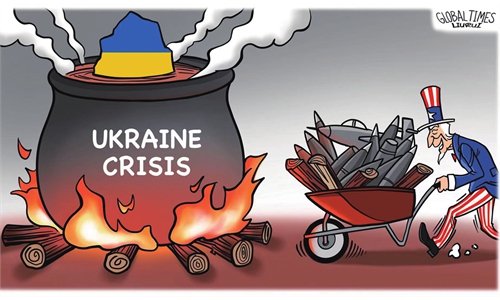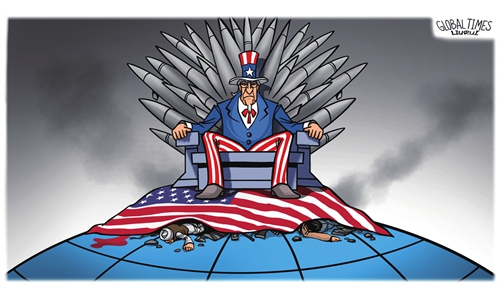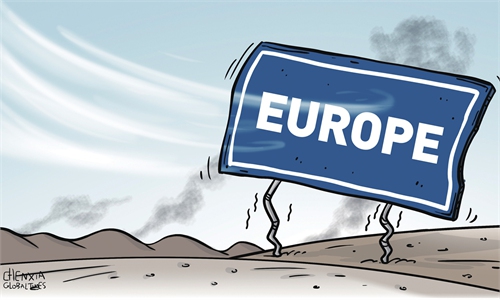Throwing in more arms to Ukraine will only escalate war with more Ukrainians dying: MEP
Editor's Note:
"How is not selling Kerrygold butter to Russia going to save any Ukrainian lives? How is buying filthy fracked US gas going to stop the war?" Clare Daly (Daly), an Irish politician and a member of the European Parliament, asked earlier this month. In an interview with Global Times (GT) reporters Bai Yunyi and Li Aixin, Daly said, "NATO has never brought peace anywhere in the world," and sanctions against Russia will "devastate the European economy."
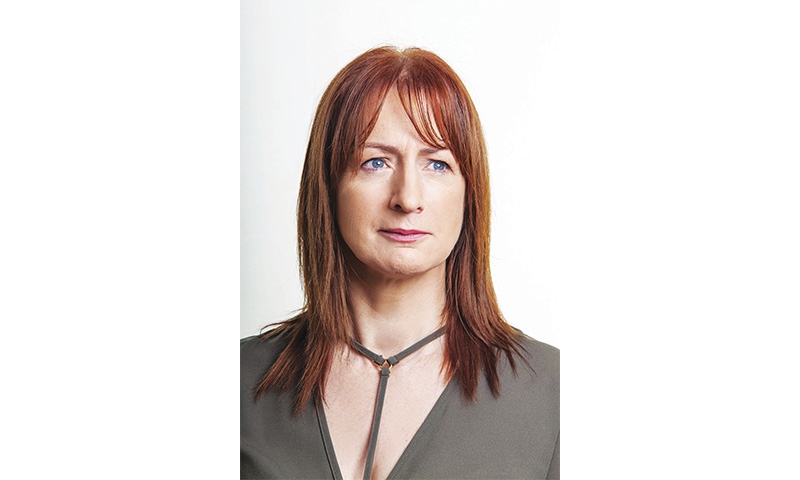
GT: You recently tweeted that "anyone demanding the EU pumps Ukraine full of lethal weapons should read it carefully. It is not as simple as you think." Could you please elaborate on the stance?
Daly: My position will be similar on the situation in any conflict area - sending more arms into a war can only result in prolonging that war. It's not that I don't believe that Ukrainians have the right to defend themselves. They do. But the reality is that over the past period, there has been a growing militarization in Ukraine.
The EU throwing in more arms will not be sufficient to defeat the Russian army. It will only lead to the war being prolonged, and more Ukrainians dying. And worryingly, those arms are being distributed to people and organizations without any checks or balances. So god only knows where those weapons will end up and when, in years to come, they will come to be used in other situations.
So, it's a very dangerous tactic. I know some of the people in Europe who are calling for this, believe that they are doing this out of the desire to protect the Ukrainian people. People would like to help innocent Ukrainians, as I would. But sending more arms in is not going to do that. The only solution is a negotiated peace settlement.
GT: What should the EU do, under the circumstances, to benefit its own interests?
Daly: Unfortunately, they aren't doing it. Up to now their strategy has been to sanction Russia for the last whole number of years, to rationalize Russophobia, to be very anti Russian in their rhetoric, and to send arms into Ukraine. That has been Europe's strategy. It clearly hasn't worked in stopping the war initially, or in stopping it since it spurted. That's the wrong strategy, clearly.
What Europe should have done is playing the role of negotiating a peace settlement, getting Ukraine and Russia around the table in serious way. The negotiations now are not really negotiations, but they have the potential to be and the EU should not be doing anything to undermine them. A serious negotiated settlement is needed, which I believe should have been around, implementing the Minsk II agreement, humanitarian corridors, recognizing the territorial integrity of Ukraine, and recognizing the rights of people in Donetsk and Luhansk as well. The fact that the war is now extending into areas like Crimea would have to be part of this. Ukraine's neutrality has to be part of the settlement. What the EU should have done is pressure both sides to get their heads together to implement that. They didn't do that. So the eventual settlement will now probably not be the same - the opportunity for Minsk II is gone. But something loosely based around it could still be delivered, and must be pursued.
GT: Are you concerned about a spillover of the conflict? Do you think there might be a chance for the US to have Europe confront Russia?
Daly: I don't think it's in the interests of the US or NATO to have the conflict go beyond Ukraine. And I don't see that happening. I think they're pretty happy to have it go on at the level at the moment - It is spurring militarism. They see it wearing down Russia. It hasn't had an impact on the Russian economy yet, but it will. It had an impact on the economies of Europe and that is going to get worse.
That's where the spillover is going to be, primarily economically in the short term rather than militarily.
GT: You have recently denounced the EU'S sanctions against Russia, why? Some sanctions have even been extended to Russian cats, dogs, works of art, etc. Do you think such sanctions can really work?
Clare: My opposition to sanctions has been misrepresented - sort of being somehow complicit in the war or a supporter of Putin, or some nonsense like this. I have condemned the Russian invasion, but my opposition to sanctions is primarily based on the fact that they don't work. They have never in history succeeded in stopping a military assault or achieving regime change. Unilateral sanctions, outside of the UN framework - are also illegal under international law. They won't be a deterrent. It is the people of Russia who will suffer from sanctions. Increasingly, it is the people of Europe who are suffering as well, because one sanctions starts on one side and it is reciprocated.
But even some of the measures being imposed by the European countries are going to primarily hurt them the most. I mean, the ruble has stabilized. The Russians are getting big money for their gas and energy supply resources at the moment.
The idea that Europe would cut its links to Russian energy supplies, which is what the US has wanted, is not in the immediate interests of Europeans. It would mean hundreds of thousands, probably millions of Europeans, losing their jobs.
Let's remember, none of these measures will have any impact on saving a single Ukrainian life. But they will devastate the European economy. That is why I oppose them. They don't do what they say they'll do. They are punitive measures, in this sense, collective punishment, which will not succeed in achieving anything, except weakening the European economy at the moment, and maybe inflicting hardship on ordinary people.
The so-called "self-sanctions" on cats, dogs, works of arts… that doesn't even deserve a comment. Really. The idea that people are not going to play Tchaikovsky because of the war is not going to have any impact on the situation in Ukraine. It's ludicrous, but it is demonizing all Russian people and their culture. This is crazy stuff.
The decision at the UN human rights council… what an outrage when you consider the appalling atrocities which have been carried out by other countries over the years. The US and its illegal wars in Iraq and Afghanistan, the genocide in Yemen… and none of these countries have ever been expelled. It's just appalling. Demonizing Russia in this way is not helpful. It simply backs Russia into a corner and lessens the chance of peace.
GT: NATO was established with the goal to safeguard peace and security in Europe. But judging from the Ukraine crisis and what happened in Afghanistan and other countries, do you think NATO is bringing peace or uncertainty to Europe and the world?
Daly: I never believed that NATO was there to safeguard peace and security in Europe. And if people thought that it was established for that, it certainly never succeeded in delivering. NATO's purpose is US control of Europe. Its first Secretary General, Lord Hastings, said that it existed "to keep the Soviet Union out, the Americans in, and the Germans down." NATO has never brought peace anywhere in the world.
It's kind of there to solve the problems that it creates. You see that very graphically in countries like Libya, where they have succeeded in decimating that country and others. They are not a force for peace at all, not just in this crisis, but in the ones before that.
Since the dissolution of the USSR, they have continued to grow nearer and nearer to Russia, despite the very clear undertaking that NATO would not expand eastward. It doesn't excuse Russia's war, but certainly helps to explain it. It would not have happened without NATO's meddling. They have helped instigate conflict.
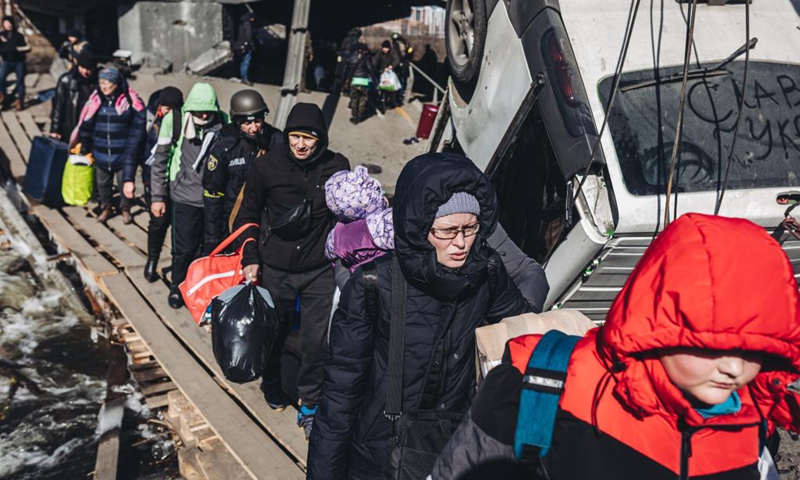
Daly: There's a kind of an irony in that question. Europe talks about wanting to be more autonomous, especially since Brexit and the election of Donald Trump. But what has emerged since the war in Ukraine is that all ideas of European autonomy have gone out the window. And they are behaving like a vassal of the US, quite literally.
Their own economic and security interests are being sacrificed for US interests against Russia. It is demonstrably in the interests of the citizens of the whole of Europe, including, first and foremost, citizens of Ukraine, that we would live in peace on our continent with Russia, that we would do business, exchange cultures and trade and economics, and live in harmony. And the only way that can be done is in a security arrangement, not against Russia, but with Russia. But sadly, everything that Europe is doing is the opposite.
This war will have the impact of driving more EU members into NATO. While they talk about being more strategic for Europe, it actually lessens Europe strategic independence.
GT: During a speech, you mentioned that it is not only Ukrainians who have been displaced by war. People in Afghanistan and other countries also face a similar humanitarian crisis. But many Europeans and Americans are indifferent. How do you understand the reasons behind the two very different attitudes toward refugees?
Daly: Firstly, they are being exposed to this war. They're exposed to daily pictures of the horror of war. They're being exposed to graphic accounts and human stories, not just numbers, but they are being introduced to the real lives of the people who are being displaced by this war, people who are losing loved ones and so on. In a positive sense, the best of humanity is being brought out in people's desire to help.
But the other side of it clearly has to be a racism, that somehow European publics are being asked to believe that Ukrainians, because they're white, they're European, that somehow there is a special value on that refugee, as opposed to a refugee from Afghanistan or Yemen or Africa, or all of the places that Europe helped to destroy and destabilize, making those people refugees in the first place.
I would hope that the difference in the response now would be the start of a change so that now there would be more public pressure for governments to be more welcoming. For years, Europe has talked about a crisis of migration and a crisis of refugees. It wasn't a crisis at all. The numbers coming to Europe are relatively small. What the Ukrainian crisis has shown is that Europe is perfectly capable of absorbing millions of refugees. So if other refugees come from other wars, I hope that the lesson will be learned and that governments will be just as welcoming. I wouldn't be so sure that will be the case to be honest, but I would hope that it would.
GT: Some observers noticed that people in China, India, and some Latin American countries do not support the US and Europe in condemning Russia, and say they do not necessarily support the war, but developed a kind of resentful psychology against the West. What's your take?
Daly: It is actually the view of the countries which hold the majority of the world's population. The countries which are taking the different view are the US, Europe, and Australia. But the bulk of the world's population live outside of that territory. And most of those would have the attitude that you've described.
It's not that they agree with the war. But they see the deep irony in the fact that the US has done regime change in countries. The US has military bases on every continent all over the world, has interfered everywhere, has committed war crimes far beyond the scale of what's happened in the Russian war. It has been the global south on the receiving end of this. And in that sense, the irony of them taking the moral high ground and condemning Russia for something that they have done so often, and turned a blind eye... it is perfectly understandable.
"How is not selling Kerrygold butter to Russia going to save any Ukrainian lives? How is buying filthy fracked US gas going to stop the war?" Clare Daly (Daly), an Irish politician and a member of the European Parliament, asked earlier this month. In an interview with Global Times (GT) reporters Bai Yunyi and Li Aixin, Daly said, "NATO has never brought peace anywhere in the world," and sanctions against Russia will "devastate the European economy."

Clare Daly. Photo: Courtesy of Clare Daly
GT: You recently tweeted that "anyone demanding the EU pumps Ukraine full of lethal weapons should read it carefully. It is not as simple as you think." Could you please elaborate on the stance?
Daly: My position will be similar on the situation in any conflict area - sending more arms into a war can only result in prolonging that war. It's not that I don't believe that Ukrainians have the right to defend themselves. They do. But the reality is that over the past period, there has been a growing militarization in Ukraine.
The EU throwing in more arms will not be sufficient to defeat the Russian army. It will only lead to the war being prolonged, and more Ukrainians dying. And worryingly, those arms are being distributed to people and organizations without any checks or balances. So god only knows where those weapons will end up and when, in years to come, they will come to be used in other situations.
So, it's a very dangerous tactic. I know some of the people in Europe who are calling for this, believe that they are doing this out of the desire to protect the Ukrainian people. People would like to help innocent Ukrainians, as I would. But sending more arms in is not going to do that. The only solution is a negotiated peace settlement.
GT: What should the EU do, under the circumstances, to benefit its own interests?
Daly: Unfortunately, they aren't doing it. Up to now their strategy has been to sanction Russia for the last whole number of years, to rationalize Russophobia, to be very anti Russian in their rhetoric, and to send arms into Ukraine. That has been Europe's strategy. It clearly hasn't worked in stopping the war initially, or in stopping it since it spurted. That's the wrong strategy, clearly.
What Europe should have done is playing the role of negotiating a peace settlement, getting Ukraine and Russia around the table in serious way. The negotiations now are not really negotiations, but they have the potential to be and the EU should not be doing anything to undermine them. A serious negotiated settlement is needed, which I believe should have been around, implementing the Minsk II agreement, humanitarian corridors, recognizing the territorial integrity of Ukraine, and recognizing the rights of people in Donetsk and Luhansk as well. The fact that the war is now extending into areas like Crimea would have to be part of this. Ukraine's neutrality has to be part of the settlement. What the EU should have done is pressure both sides to get their heads together to implement that. They didn't do that. So the eventual settlement will now probably not be the same - the opportunity for Minsk II is gone. But something loosely based around it could still be delivered, and must be pursued.
GT: Are you concerned about a spillover of the conflict? Do you think there might be a chance for the US to have Europe confront Russia?
Daly: I don't think it's in the interests of the US or NATO to have the conflict go beyond Ukraine. And I don't see that happening. I think they're pretty happy to have it go on at the level at the moment - It is spurring militarism. They see it wearing down Russia. It hasn't had an impact on the Russian economy yet, but it will. It had an impact on the economies of Europe and that is going to get worse.
That's where the spillover is going to be, primarily economically in the short term rather than militarily.
GT: You have recently denounced the EU'S sanctions against Russia, why? Some sanctions have even been extended to Russian cats, dogs, works of art, etc. Do you think such sanctions can really work?
Clare: My opposition to sanctions has been misrepresented - sort of being somehow complicit in the war or a supporter of Putin, or some nonsense like this. I have condemned the Russian invasion, but my opposition to sanctions is primarily based on the fact that they don't work. They have never in history succeeded in stopping a military assault or achieving regime change. Unilateral sanctions, outside of the UN framework - are also illegal under international law. They won't be a deterrent. It is the people of Russia who will suffer from sanctions. Increasingly, it is the people of Europe who are suffering as well, because one sanctions starts on one side and it is reciprocated.
But even some of the measures being imposed by the European countries are going to primarily hurt them the most. I mean, the ruble has stabilized. The Russians are getting big money for their gas and energy supply resources at the moment.
The idea that Europe would cut its links to Russian energy supplies, which is what the US has wanted, is not in the immediate interests of Europeans. It would mean hundreds of thousands, probably millions of Europeans, losing their jobs.
Let's remember, none of these measures will have any impact on saving a single Ukrainian life. But they will devastate the European economy. That is why I oppose them. They don't do what they say they'll do. They are punitive measures, in this sense, collective punishment, which will not succeed in achieving anything, except weakening the European economy at the moment, and maybe inflicting hardship on ordinary people.
The so-called "self-sanctions" on cats, dogs, works of arts… that doesn't even deserve a comment. Really. The idea that people are not going to play Tchaikovsky because of the war is not going to have any impact on the situation in Ukraine. It's ludicrous, but it is demonizing all Russian people and their culture. This is crazy stuff.
The decision at the UN human rights council… what an outrage when you consider the appalling atrocities which have been carried out by other countries over the years. The US and its illegal wars in Iraq and Afghanistan, the genocide in Yemen… and none of these countries have ever been expelled. It's just appalling. Demonizing Russia in this way is not helpful. It simply backs Russia into a corner and lessens the chance of peace.
GT: NATO was established with the goal to safeguard peace and security in Europe. But judging from the Ukraine crisis and what happened in Afghanistan and other countries, do you think NATO is bringing peace or uncertainty to Europe and the world?
Daly: I never believed that NATO was there to safeguard peace and security in Europe. And if people thought that it was established for that, it certainly never succeeded in delivering. NATO's purpose is US control of Europe. Its first Secretary General, Lord Hastings, said that it existed "to keep the Soviet Union out, the Americans in, and the Germans down." NATO has never brought peace anywhere in the world.
It's kind of there to solve the problems that it creates. You see that very graphically in countries like Libya, where they have succeeded in decimating that country and others. They are not a force for peace at all, not just in this crisis, but in the ones before that.
Since the dissolution of the USSR, they have continued to grow nearer and nearer to Russia, despite the very clear undertaking that NATO would not expand eastward. It doesn't excuse Russia's war, but certainly helps to explain it. It would not have happened without NATO's meddling. They have helped instigate conflict.

People evacuate in Irpin, Ukraine, March 11, 2022. Photo: Xinhua
GT: A call for greater Europe strategic autonomy has been voiced for some time. Do you share this view? What kind of security mechanism should Europe pursue?Daly: There's a kind of an irony in that question. Europe talks about wanting to be more autonomous, especially since Brexit and the election of Donald Trump. But what has emerged since the war in Ukraine is that all ideas of European autonomy have gone out the window. And they are behaving like a vassal of the US, quite literally.
Their own economic and security interests are being sacrificed for US interests against Russia. It is demonstrably in the interests of the citizens of the whole of Europe, including, first and foremost, citizens of Ukraine, that we would live in peace on our continent with Russia, that we would do business, exchange cultures and trade and economics, and live in harmony. And the only way that can be done is in a security arrangement, not against Russia, but with Russia. But sadly, everything that Europe is doing is the opposite.
This war will have the impact of driving more EU members into NATO. While they talk about being more strategic for Europe, it actually lessens Europe strategic independence.
GT: During a speech, you mentioned that it is not only Ukrainians who have been displaced by war. People in Afghanistan and other countries also face a similar humanitarian crisis. But many Europeans and Americans are indifferent. How do you understand the reasons behind the two very different attitudes toward refugees?
Daly: Firstly, they are being exposed to this war. They're exposed to daily pictures of the horror of war. They're being exposed to graphic accounts and human stories, not just numbers, but they are being introduced to the real lives of the people who are being displaced by this war, people who are losing loved ones and so on. In a positive sense, the best of humanity is being brought out in people's desire to help.
But the other side of it clearly has to be a racism, that somehow European publics are being asked to believe that Ukrainians, because they're white, they're European, that somehow there is a special value on that refugee, as opposed to a refugee from Afghanistan or Yemen or Africa, or all of the places that Europe helped to destroy and destabilize, making those people refugees in the first place.
I would hope that the difference in the response now would be the start of a change so that now there would be more public pressure for governments to be more welcoming. For years, Europe has talked about a crisis of migration and a crisis of refugees. It wasn't a crisis at all. The numbers coming to Europe are relatively small. What the Ukrainian crisis has shown is that Europe is perfectly capable of absorbing millions of refugees. So if other refugees come from other wars, I hope that the lesson will be learned and that governments will be just as welcoming. I wouldn't be so sure that will be the case to be honest, but I would hope that it would.
GT: Some observers noticed that people in China, India, and some Latin American countries do not support the US and Europe in condemning Russia, and say they do not necessarily support the war, but developed a kind of resentful psychology against the West. What's your take?
Daly: It is actually the view of the countries which hold the majority of the world's population. The countries which are taking the different view are the US, Europe, and Australia. But the bulk of the world's population live outside of that territory. And most of those would have the attitude that you've described.
It's not that they agree with the war. But they see the deep irony in the fact that the US has done regime change in countries. The US has military bases on every continent all over the world, has interfered everywhere, has committed war crimes far beyond the scale of what's happened in the Russian war. It has been the global south on the receiving end of this. And in that sense, the irony of them taking the moral high ground and condemning Russia for something that they have done so often, and turned a blind eye... it is perfectly understandable.
